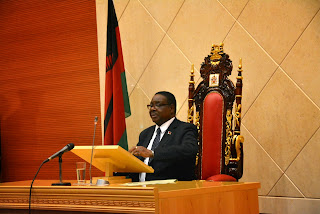 |
| Kachale: Her office was never consulted |
The Director of Public Prosecution (DPP) has told Legal Affairs Committee of Parliament that the commencement of the Kenneth ‘Ken’ Msonda’s ‘Kill gays’ criminal case was done without consulting her office.
DPP, Mary Kachale, was appearing before the Committee on Thursday afternoon to justify her decision to discontinue the criminal case No 16 of 2016, Republic Versus Kenneth Msonda on Inciting another to contravene the law contrary to section 124 (1)(b) of the penal code.
Politician, Msonda is allegedly to have openly suggested the killing of homosexuals as the only solution to end the rising cases of homosexuality in the country which the charge sheet cited him conduct to have contravened section 209 of the penal code.
It is reportedly that in that Facebook post, the Peoples Party (PP) Publicity and Administrative Secretary, Msonda, had further described homosexual people “worse than ‘dogs” and are “sons and daughters of the devil”
 |
Chakhwantha: his committee acknowledged the
DPP concern |
“She has told the committee that she had to discontinue the case on technical grounds especially where she noted that private lawyers who instituted the criminal proceedings had bypassed her office.” Disclosed Peter Chakhwantha, Chairperson for the Committee after holding a camera interface with Kachale
“The lawyers did not seek consent from her office which is a requirement of the law and again they had also put themselves on record as if they were sent by the office of the DPP as the charge sheet indicates that the case was Republic versus Ken Msonda.
Where you have a charge drawn in that manner that shows it is the state prosecuting, but in this case the irony is that it was a private lawyer who had gone to court to commence criminal proceedings as if the proceedings were commenced by the office of the DPP. So, where that conflict had risen the DPP had to intervene by withdraw that case” he said
Chakhwantha then said his committee noted and agreed with the DPP on the existence of laws that guide private citizens when commencing criminal proceedings against any person before any court and such procedures were in this case supposed to be followed. He said the committee also observed the failure by Magistrate court to guide the lawyers on how they could have properly commenced that case.
“The law allows the private citizens to commence criminal proceedings. However there are checks and balances, among them is requirement that you have to go by the office of Director of Public Prosecutions. You can allege that the criminal offense has been committed and go to the Magistrate, but even before the magistrate signs the charge sheet, the court has to follow few steps particularly investigate allegations and come up with results in writing to the DPP.” He explained
“In this manner of the case of Ken Msonda, the Magistrate did not even fulfill those requirements. This is where the office of the DPP also faulted the entire commencement of this criminal case.” Said Chakhwantha
Chakhwantha revealed that the DPP, Mary Kachale during the meeting could not say if her office had found Msonda with possible case because she was of the view that she needed to consult for legal opinion on the matter first since Msonda alleged remarks started on Facebook post and media interviews which at the moment her office does not have evidence.
The Legal Affairs Chairperson, further disclosed that during their meeting, the DPP, has told them that at the moment if private members are still of the view that there is need for the recommencement of the case they can do so but under a different case designation; meaning the recommenced case will come again under different case number but not similar case number which was discontinued.
“There is a requirement under the law that once the case has been discontinued within six months it can be recommenced but from her own word she is not ready and willing to recommence the case. This is where she had to say if members of the general public are of the view that the matter should go back to court then they can only do that under a different case number not the one she has discontinued.” Said Chakhwantha
On the way forward as Committee having listened to justification of the discontinuous of the case by DPP, Chakhwantha said “As the committee, we are supposed to discuss the presentation and come up with the resolution on Friday.”
Copy Of Charge Sheet
Criminal Case No. 16 of 2016
THE REPUBLIC VERSUS KENNETH MSONDASUMMONS/CHARGE SHEET(SECTIONS 83 AND 84 OF THE CRIMINAL PROCEDURE AND EVIDENCE CODE)
Accused Name: Kenneth MsondaTO: Kenneth Msonda above named.
Whereas your presence is necessary to answer the charge(s) hereunder set out you are hereby required to appear in person before this Court on the 22nd day of January 2016 at 9 o'clock in the fore noon.
And Herein fail not.
Dated this 8th day of January 2016.
Signed (Resident Magistrate) OFFENCE (SECTION AND LAW) Inciting another to contravene the law, contrary to Section 124 (1)(b) of the penal code.
Kenneth Msonda on or about the 2nd January 2016 in the City of Blantyre indicated or implied to members of the general public that it was desirable for them to contravene section 209 of the penal code by unlawfully killing people of the homosexual orientation.
Dated the 8th day of January 2016
Signed: KHUMBO BONZOE SOKO AND GIFT NANKHUNI Prosecutors (On behalf of the Complainants).












